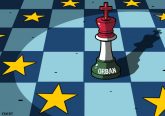 Was it not Germany’s choice and commitment to be a civilian power? The German federal elections have run their course and the CDU/CSU gained the lion’s share of the public’s support. Apparently the electoral results were unaffected by the major political scandal of the summer – the spectacular failure of the Euro Hawk surveillance drone programme. The programme has been in the making for 13 years during three consecutive government mandates – in two of these mandates the CDU/CSU has been the major political power. The ‘rise and fall’ of the surveillance drone has also come at a cost of half a billion euros to the German taxpayers. Should such a scandal be forgotten so quickly?
Was it not Germany’s choice and commitment to be a civilian power? The German federal elections have run their course and the CDU/CSU gained the lion’s share of the public’s support. Apparently the electoral results were unaffected by the major political scandal of the summer – the spectacular failure of the Euro Hawk surveillance drone programme. The programme has been in the making for 13 years during three consecutive government mandates – in two of these mandates the CDU/CSU has been the major political power. The ‘rise and fall’ of the surveillance drone has also come at a cost of half a billion euros to the German taxpayers. Should such a scandal be forgotten so quickly?
‘Drones’ evoke recent American military campaigns, rather than the dusty Ministerial offices in the German capital. Thus, in the summer of 2013, the news of the ‘rise and fall’ of a German surveillance drone caught the German and European public by surprise. As the long silence of the German government on the acquisition of this new military capability was suddenly broken, the public learnt with astonishment that for 13 years the programme has been lurching on, even though the surveillance drone’s flying problems have long been ‘ a fact universally acknowledged.’ Years have gone by, but the technological problems have remained unresolved and the aviation authorities would not certify the Unmanned Aerial Vehicle (UAV) due to its lack of an anti-collision system. In 2013, Germany finally bid an official farewell to the Euro Hawk. Amidst the noise of the heated televised debates and the tearful (for some) farewell to this particular weapon, the old message that once Hemingway made about the hopelessness and futility of war was all but muted.
Of course, the most troubling question remained: How did the Euro Hawk programme escape the public gaze for so long?
Back in 2001, during Chancellor Schroeder’s time, a Social Democrat-Green Party coalition government put their heads (and money) together to embark upon procuring the Euro Hawk, a variant of the US-developed Global Hawk, a spy drone, built by the American company Northrop Grumman [1]. The result of the cooperation between Northrop Grumman and Europe’s EADS (European Aeronautic Defence and Space), the Euro Hawk was supposed to enhance the surveillance capabilities of the German military and support NATO’s Alliance Ground Surveillance system.
In 2004, the Bundeswehr asked EADS and Northrop Grumman to present an offer for the development, production and delivery of a Euro Hawk. In the following year EADS and Northrop Grumman founded the ‘Euro Hawk GmbH’. The two founders presented their bid in December of the same year, although public announcements about the project appear not to have been made. In 2007, with the conservative government of chancellor Angela Merkel already in office, the contracts were signed. Two years later German military inspectors voiced concerns about potential flight permit issues. However, under pressure from the Defense Ministry, with Karl-Theodor zu Guttenberg (Christian Social Union ) as minister, a military inspector eventually carried out the necessary tests allowing for a temporary flight permission [2] .
The Euro Hawk finally made a cross-Atlantic, 22 hour, trip from USA to Germany in 2011. Towards the end of the year, the German Defence Ministry under the current minister, Thomas de Maizière (Christian Democratic Union), discovered that flight permits would cost an additional 500 to 600 million euros. The end of the Euro Hawk saga came in 2012, when de Maizière stopped the drone project, because of very significant problems in obtaining flight permits for the European airspace. The Defence Ministry grounded its decision, to suddenly halt the Euro Hawk programme, on the expected additional costs of up to 600 million euros [3].
A fresh military surveillance drone scandal – this is not what Germany’s governing coalition wanted in the months leading up to the national parliamentary September elections in 2013. Huge costs, shady procurement procedures, and in general: the whole manner in which the programme had been organised by the German Ministry of Defence, have caused public outrage. Consequently, the Euro Hawk, the fruit of years of German Defence Ministry’s back-door dealings, has dropped from the sky and landed on the Bundestag’s debating table.
The German Bundestag launched a formal inquiry [4], and in June, 2013 the Defence Minister de Maizière faced the music. However, during the Bundestag hearings the Defence Minister repeatedly made false statements about a key question. Thus, he bid farewell not only to the Euro Hawk programme, but also to his reputation for being a capable and unpartisan bureaucrat. Calls for de Maizière’s resignation were made, but no resignation was tabled [5] . He managed to cling to his post until the elections.
In this story of ‘heroic defence’ there are no heroes, and what started as a promising flight of the super-drone has finished as a super-scandal. But it has been a scandal in the making of three consecutive governments, which have managed to keep the German public in the dark for 13 consecutive years. Clausewitz famously decreed that ‘war is the continuation of politics by other means.’ Politics does entail the slow and messy business of public debate; however if we take ‘politics’ out of the famous old maxim, we are left only with ‘war.’
Now that the super-drone has been super-grounded, some day it can maybe take its place in a future German Military Museum of Technology, if such a place is ever created. Delivering foreign aid worth half a billion euros would have been the most powerful weapon, obliterating the need for the drone. It was for the German public to make this choice, demanding not ‘How much?’ but ‘Why?’
But now the Christian-Democrats celebrate victory, and it is not the time for such troubling thoughts. The German public has given strong public support to CDU/CSU for a third consecutive term, in spite of the fresh drone scandal. Maybe now even the former Defence Minister de Maizière will be able to get back his old job. Lucky him!
This post originally appeared on the website of the London Progressive Journal.
References:
[1] http://www.dw.de/the-euro-hawk-scandal-a-chronicle/a-16856113
[4] http://www.dw.de/committee-probes-german-ministrys-drone-debacle/a-16988142







No Comment